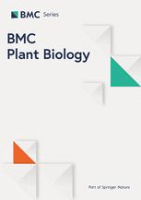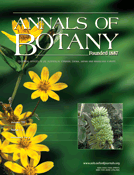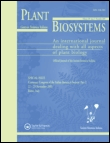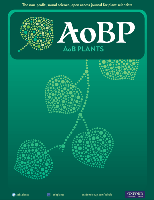
Plants-Basel
Scope & Guideline
Connecting researchers to the world of plant science.
Introduction
Aims and Scopes
- Plant Molecular Biology and Genetics:
Research related to the molecular mechanisms of plant development, stress responses, and genetic modifications aimed at improving crop performance and resilience. - Plant Ecology and Environmental Interactions:
Studies focusing on plant interactions with their environment, including responses to climate change, soil health, and biodiversity conservation. - Agricultural Practices and Crop Management:
Research on sustainable agricultural practices, including the use of biostimulants, organic amendments, and innovative irrigation techniques to improve crop yields and quality. - Phytochemistry and Bioactivity:
Exploration of plant secondary metabolites for their potential health benefits, including antioxidant, antimicrobial, and anti-inflammatory properties. - Biotechnological Applications in Agriculture:
Application of biotechnological tools for crop improvement, including genetic engineering, CRISPR technology, and tissue culture techniques.
Trending and Emerging
- Climate Change Impact on Plant Systems:
Research increasingly focuses on how climate change affects plant physiology, distribution, and interactions, emphasizing the need for adaptive strategies in agriculture. - Plant-Microbe Interactions:
There is a growing interest in understanding the symbiotic relationships between plants and microorganisms, particularly in enhancing plant resilience to biotic and abiotic stresses. - Omics Technologies in Plant Research:
The application of genomics, transcriptomics, and metabolomics is on the rise, providing deeper insights into plant responses and adaptations. - Sustainable Agricultural Practices:
Research is trending towards sustainable practices that incorporate organic amendments, biostimulants, and integrated pest management to enhance food security. - Biopesticides and Biocontrol Agents:
Increasing attention is being paid to the development and application of natural pesticides and biological control agents, reflecting a shift towards environmentally friendly agricultural practices.
Declining or Waning
- Traditional Plant Breeding Techniques:
While still important, the focus on conventional breeding methods is declining as genetic engineering and biotechnological approaches gain momentum. - Invasive Species Management:
Research on invasive species management is less frequent, possibly due to a growing emphasis on native plant conservation and ecological restoration. - Herbal Medicine and Ethnobotany:
Interest in traditional herbal medicine and ethnobotanical studies appears to be waning, overshadowed by more molecular and biotechnological approaches. - Basic Plant Physiology Studies:
There seems to be a reduced focus on fundamental physiological studies, as researchers increasingly integrate physiological data with molecular and genomic insights. - Soil Microbiology without Plant Interactions:
Studies that focus solely on soil microbiology without considering plant interactions are becoming less common, as interdisciplinary approaches gain popularity.
Similar Journals

BMC PLANT BIOLOGY
Empowering the Future of Plant BiologyBMC Plant Biology, published by BMC, is a leading open-access journal devoted to the field of plant science, presenting high-quality research that contributes significantly to the understanding of plant biology. Since its inception in 2001, the journal has established itself as a prominent platform for disseminating innovative research, achieving a commendable Q1 ranking in Plant Science within the 2023 Scopus quartiles, and ranking #39 out of 516 journals in the Agricultural and Biological Sciences category, indicating its substantial impact with a 92nd percentile ranking. Researchers, professionals, and students engaged in the study of plant biology will find a wealth of knowledge in its comprehensive scope, covering critical areas such as molecular biology, genetics, ecology, and biotechnology. The journal's commitment to open access ensures that cutting-edge research is available to a global audience, fostering collaboration and advancement in the field. BMC Plant Biology continues to inspire and facilitate growth in plant-related studies, making it an invaluable resource for anyone interested in the vibrant and essential domain of plant science.

ANNALS OF BOTANY
Advancing Botanical Knowledge for a Greener TomorrowANNALS OF BOTANY, published by Oxford University Press, stands as a leading journal in the field of Plant Science, with a distinguished history that dates back to 1887. This esteemed journal, recognized for its contribution to the advancement of botanical research, holds a prestigious Q1 quartile ranking in its category as of 2023. With a commitment to sharing high-quality, peer-reviewed research, ANNALS OF BOTANY provides a vital platform for researchers, professionals, and students to disseminate novel findings and engage in scholarly discourse. Although it does not currently offer open access options, the journal remains accessible to a wide academic audience, further cementing its role in facilitating the exchange of knowledge within the global botanical community. For those interested in the dynamic and evolving world of plant sciences, ANNALS OF BOTANY is an indispensable resource.

PLANT BIOSYSTEMS
Unveiling the Complexities of Plant Ecology and EvolutionPLANT BIOSYSTEMS, published by TAYLOR & FRANCIS LTD, is a leading academic journal dedicated to advancing the understanding of plant systems and their ecological interactions. With an ISSN of 1126-3504 and an E-ISSN of 1724-5575, this journal holds a significant place in the fields of Ecology and Plant Science, earning a Q2 rank in both categories as of 2023. Established in 1993 and continuing robustly through to 2024, it aims to provide a platform for pioneering research that encompasses a wide array of topics, from evolutionary biology to plant-environment interactions. Although not an open-access journal, it maintains a strong reputation, backed by its impressive Scopus rankings—positioned at #179 in Ecology, Evolution, Behavior and Systematics and #138 in Plant Science, placing it within the top percentiles. PLANT BIOSYSTEMS is a vital resource for researchers, professionals, and students who are keen to contribute to and learn from cutting-edge findings in the ever-evolving domain of plant sciences.

JOURNAL OF PLANT BIOCHEMISTRY AND BIOTECHNOLOGY
Nurturing Sustainable Practices through Plant Science ResearchJOURNAL OF PLANT BIOCHEMISTRY AND BIOTECHNOLOGY, published by SPRINGER INDIA, is a leading publication dedicated to advancing research in the fields of plant biochemistry, biotechnology, agronomy, and crop science. With an ISSN of 0971-7811 and E-ISSN 0974-1275, the journal encompasses a wide range of studies aimed at enhancing our understanding of plant biological processes and their applications in agriculture and biotechnology. It has achieved a noteworthy Q2 ranking in Agronomy and Crop Science and Plant Science, as well as a Q3 ranking in Biotechnology, reflecting its quality and relevance in contemporary research. Notably, the journal ranks #166 in Plant Science and #133 in Agronomy, both falling in the top 67th percentile. With a rich history spanning from 1992 to 2024, the journal is committed to providing open access to innovative research findings that bridge the gap between laboratory discoveries and their practical applications in sustainable agriculture. Researchers, professionals, and students will find a wealth of knowledge and inspiration to advance their work in the dynamic field of plant sciences at this esteemed journal.

Horticulture Environment and Biotechnology
Transforming Horticulture through Cutting-Edge ResearchHorticulture Environment and Biotechnology is a prestigious journal published by the Korean Society of Horticultural Science, dedicated to advancing knowledge in the fields of horticulture, biotechnology, and plant science. Since its inception in 2011, this journal has played a crucial role in disseminating high-quality research, evidenced by its 2023 category quartile rankings, which position it in Q1 for Horticulture and Q2 for Biotechnology and Plant Science. With impressive Scopus rankings, including Rank #18 out of 115 in Horticulture, the journal continues to demonstrate its significance within the academic community by contributing to innovative practices and findings that impact both environmental sustainability and horticultural advancements. Currently, the journal is accessible to a global audience, facilitating the exchange of ideas and research outcomes with no open-access fees. Horticulture Environment and Biotechnology strives to support researchers, professionals, and students alike by providing a platform for critical discussions on the intersection of horticultural science and biotechnology, thereby fostering the development of sustainable agricultural practices that align with contemporary challenges.

Egyptian Journal of Botany
Pioneering insights in plant biology and crop science.Egyptian Journal of Botany is a premier publication in the field of botanical sciences, encompassing agricultural research, plant biology, and ecology. Published by the NATL INFORMATION DOCUMENTATION CENT, ACAD SCIENTIFIC RESEARCH & TECHNOLOGY in Egypt, this journal has made significant strides since its establishment, now recognized within several prestigious Scopus quartiles including Q3 in Agronomy and Crop Science, and Q3 in Ecology, reflecting its impact and relevance in the scientific community. With an aim to disseminate high-quality research and foster innovation in plant sciences, the journal provides a platform for researchers, professionals, and students alike to share vital findings and advancements. Although it currently operates under traditional access, the wealth of knowledge it offers is pivotal for those engaged in ecological preservation, crop improvement, and biotechnological applications. With its comprehensive scope and evolving reputation, the Egyptian Journal of Botany is poised to remain an influential player in the botanical sciences from 2019 to 2024 and beyond.

Nature Plants
Fostering Innovation in Agriculture and EcologyNature Plants is a premier journal dedicated to the dynamic and interdisciplinary field of plant science, published by NATURE PORTFOLIO in the United Kingdom. With an impressive impact factor placing it in the top tier of scholarly journals—ranking Q1 in Plant Science for 2023—this journal sets a high standard for research dissemination. Nature Plants has maintained a remarkable Scopus Rank of 5 out of 516 in the Agricultural and Biological Sciences category, reflecting its pivotal role in advancing knowledge in the field. The journal aims to provide a platform for groundbreaking research that addresses key challenges in plant biology, ecology, and agriculture, thereby fostering a deeper understanding of plant science's contribution to global sustainability. Although primarily non-open access, it offers exclusive insights and robust discussions, making it an indispensable resource for researchers, professionals, and students eager to explore the latest advancements and innovations in plant science.

PLANT SOIL AND ENVIRONMENT
Empowering Research for Sustainable Agricultural Practices.PLANT SOIL AND ENVIRONMENT is a premier open-access journal dedicated to the interdisciplinary study of soil science, agronomy, and environmental interactions, published by the Czech Academy Agricultural Sciences. With an ISSN of 1214-1178 and E-ISSN 1805-9368, this journal has been a vital platform for dissemination of research since its inception in 2002. Based in the Czech Republic, it has garnered a robust reputation within its field, as indicated by its impressive Q2 ranking in Soil Science and ranking #47 out of 159 in the Scopus Ranks for Agricultural and Biological Sciences, placing it in the 70th percentile overall. The journal explores diverse topics within soils and their significant roles in plant health, ecosystem services, and sustainable agricultural practices, contributing important insights that benefit researchers, practitioners, and policy-makers alike. Aiming for a global outreach, PLANT SOIL AND ENVIRONMENT not only facilitates open dialogue among scientists but also ensures that cutting-edge research is freely accessible to enhance the knowledge base in soil science.

aBIOTECH
Innovating agronomy through impactful research.aBIOTECH, published by SPRINGERNATURE, is a premier academic journal dedicated to advancing the fields of biotechnology, agronomy, and molecular biology. With an impressive ISSN of 2096-6326 and E-ISSN 2662-1738, this journal has established itself as a vital resource for researchers and professionals aiming to publish high-quality, impactful studies. Based in Singapore, aBIOTECH has achieved remarkable recognition, boasting a Q1 ranking in multiple categories including Agronomy and Crop Science, Biochemistry, and Genetics in the 2023 Scopus rankings. Its solid position in the 90th percentile for Biochemistry and Genetics reinforces its significance within the global scientific community. The journal covers a broad spectrum of topics relevant to both basic and applied research, facilitating a shared dialogue amongst scientists and encouraging collaborative progress in innovative biotechnological applications. The open-access nature of the journal ensures that cutting-edge research is freely available, fostering a global exchange of ideas that is critical to the advancement of science today.

AoB Plants
Empowering discovery in plant biology and ecology.AoB Plants is a distinguished open-access journal published by Oxford University Press, dedicated to advancing the field of plant science. Since its inception in 2009, this journal has played a pivotal role in disseminating high-quality research that encompasses a wide range of topics including plant biology, ecology, and biotechnology. With an impressive impact factor and a ranking in the Q1 quartile for Plant Science, AoB Plants is recognized for its innovative contributions and scholarly rigor, ranking #129 out of 516 in the Scopus Agricultural and Biological Sciences category, placing it in the 75th percentile among its peers. By promoting open-access availability of research findings, the journal empowers researchers and practitioners alike, facilitating greater collaboration and knowledge sharing in the global scientific community. Situated in the heart of the United Kingdom, AoB Plants continues its commitment to providing a platform for pioneering research and developments in plant science, thus fostering a deeper understanding of the crucial roles that plants play in our ecosystems and economies.